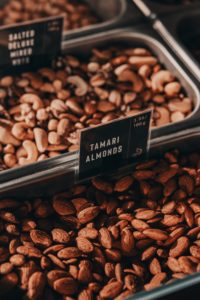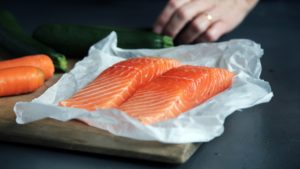The adage “you are what you eat” not only applies to our overall health but how our skin looks and feels. We know nutrition is important for health, your metabolism, and other organs such as your heart and liver, but did you know it is just as important for your skin.
According to recent research, scientists are increasingly convinced that what you eat can significantly affect the health and aging of your skin.
This post looks at a few foods that you can add to your diet to keep your skin looking and feeling healthy.
Avocados
Avocados are full of healthy fats and are great for your skin, including many other body functions. Getting enough of these fats is essential to help keep skin flexible and moisturized.
Healthy fats are associated with more supple and springy skin. There is preliminary evidence that avocados contain compounds that may help protect your skin from sun damage. UV damage can cause premature wrinkles and other signs of aging (i.e. aging spots).
Avocados are packed with vitamin E, which is an important antioxidant that helps protect your skin for oxidation. Most of us don’t get enough Vitamin E through our diet.
Although Vitamin C deficiency is rare these days, common symptoms include dry, rough, and scaly skin. A serving of 100-grams, or 1/2 an avocado provides 14% of the Daily Value (DV) for vitamin E and 11% of the DV for vitamin C.
Combining Vitamin E with Vitamin C seems to be more effective. Vitamin C helps your skin produce needed collagen, which is a required structural protein that keeps your skin strong and healthy.
Walnuts

Another great source of essential fatty acids is Walnuts. Walnuts have many characteristics that make them a great food source for healthy skin. They are rich in omega-3 and omega-6 fatty acids. Although many nuts have both omega-3 and omega-6, walnuts contain a good ratio of both essential fatty acids.
Keep in mind a diet too high in omega-6 can cause an inflammatory reaction which can cause skin irritation, but omega-3 helps reduce inflammation in your body. Also, Walnuts contain other nutrients that your skin needs to function properly and stay healthy. Walnuts contain vitamin E, Selenium, (28 grams) contain 5-6 grams of protein and 8% of the DV for zinc. Zinc is an essential nutrient for skin and it also necessary for wound healing and combating bacteria and inflammation.
Sunflower Seeds
In general, nuts and seeds are good sources of skin-boosting nutrients, but sunflower seeds are an excellent example of a great nutrient for the skin. One ounce (28 grams) of sunflower seeds packs almost 50% of the DV for vitamin E, which is an important antioxidant, 40% of the DV for selenium, 14% of the DV for zinc and 5.5 grams of protein.
Peppers – Red, Yellow, or Orange
Bell peppers are an excellent source of beta carotene. One cup (150 grams) of bell pepper contains approximately 150% of the DV for vitamin A. They also contain Vitamin C which is necessary for creating collagen. Again collagen keeps your skin firm and strong.
Broccoli
Broccoli is one of my favorite veggies and they are full of vitamins and minerals that are important for skin health. They are loaded with Zinc, Vitamin A, lutein, Vitamin C, and other good stuff. Lutein helps protect your skin from oxidative damage, which reduces dryness and wrinkles. Sulforaphane is a powerful protective agent against sun damage, which may have anti-cancer effects, and can be found in broccoli florets.
Soy
Soy contains isoflavones, which has been shown to improve wrinkles, improve collagens skin elasticity, and dryness. There is research that shows postmenopausal women who eat soy over an 8 – 12 week period saw reduced fine wrinkles and improved skin elasticity.
Dark Chocolate – yeah!!!
If you need one reason to eat chocolate, here it is. Cocoa has an awesome effect on your skin. Cocoa powder is high in antioxidants, which lessens dryness, skin thickness, skin texture, and blood flow which brings more nutrients to the skin. Make sure you eat dark chocolate with at least 70% cocoa to get maximum benefits. Remember to keep sugar to a minimum, so everything in moderation.
Fatty Fish

Although, I’m a vegetarian and I don’t eat meat or fish Salmon, mackerel and herring are excellent sources for omega-3 fatty acids. As stated before omega-3 is an excellent source of nutrients for the skin. Omega-3 in fish reduces inflammation, which can cause redness and acne. Fatty fish is also an excellent source of vitamin E which is an important antioxidant for your skin. Fish is also a quality protein and it maintains the integrity of the skin.
Green Tea
Green tea has powerful compounds called catechins and they work to improve the health of the skin by activating collagen. It also improves the moisture, roughness, thickness, and elasticity of their skin.
For individuals who have questions about medical skin conditions such as acne, rosacea, eczema, or psoriasis, please discuss with your physician.
Sources:
“What to Eat for Glowing Skin”., American Academy of Dermatology. (2007, November 15)
“The ABCs of Healthy Skin Diet”., WebMD By Colette Bouchez
“Diet and Dermatology: The Role of Dietary Intervention in Skin Disease”., The Journal of Clinical and Aesthetic Dermatology. (2014, July 7: p 46-51)
“Effects of Isoflavones on the Skin of Postmenopausal Women: A Pilot Study”., Clinics (Sao Paulo). 2009 Jun; 64(6): 505-510.
This article is provided for informational purpose only and is not intended as medical advice, or as a substitute for the medical advice of a physician









Thank you for sharing your knowledge with us. Who would I knew that sunflower seed would help your skin. Remember how much we used to eat them as kids.???? You’re doing a outstanding job in keeping us healthy and fit. Love you Dr. D. , Lauri